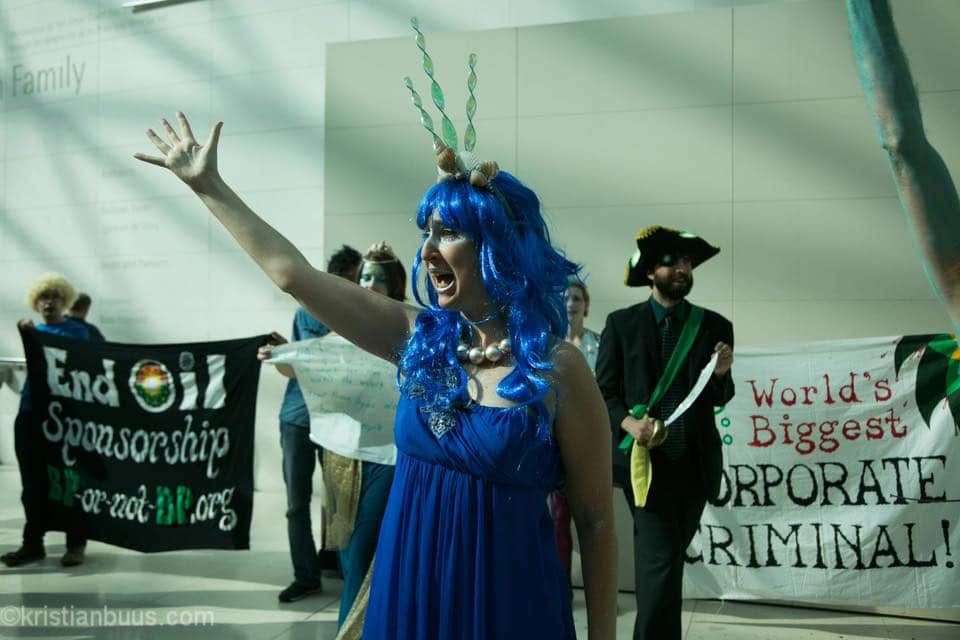The British Museum has failed to assess the ethical issues involved in having oil giant BP sponsor its gallery, argue campaign group Art Not Oil, upon the release of new documents.
Information provided by the British Museum to Art Not Oil through a freedom of information request shows the museum does not have an ethics committee or policy, and trustees were not involved in the decision to renew BP’s sponsorship for another five years.
Instead, the choice to renew the deal was made entirely by the museum’s new director Harwig Fischer, with trustees later being “informed” of the controversial decision prior to the public announcement in July.
For these reasons, Art Not Oil is arguing the museum broke its own rules by not involving the trustees in a decision which raises ethical questions. The deal with BP is therefore “illegitimate and must be reversed” the group said.
The news comes on the same day that museum trustees met in Manchester for an ‘away day’. It is believed this is the first time they will be meeting since the museum decided to renew the BP deal.
As Art Not Oil explains, sponsorship deals such as this give companies a “social license to operate” despite the destructive impact their operations have on the climate.
According to the campaign group, the former director of the British Museum, Neil MacGregor, outlined the museum’s decision-making process in a November 2015 letter to staff represented by the Public and Commercial Services Union.
In it, he wrote: “Any ethical questions which arise in the context of the Museum’s activities or sponsorships are discussed and decided by the Board of Trustees.”
However, according to the information released today, this does not appear to have happened.
Jess Worth from Art Not Oil said: “Without a dedicated ethics policy, an ethics committee or active oversight by its trustees, the director could overlook BP’s role as one of the world’s most destructive fossil fuel companies and ignore the damage it is doing to the museum’s reputation.
“The renewal meets neither the ethical standards we expect of leading museums nor the ethical standards being demanded by the public.”
“This is very disappointing,” said Clara Paillard, president of the PCS Union Culture Sector which represents many British Museum staff.
“[Neil MacGregor] assured us that any ethical questions arising around sponsorship are discussed and decided by the Board of Trustees, and that they take this very seriously.”
Yet a spokesperson for the British Museum, speaking to the Independent, rejected the claims made by Art Not Oil, stating they were confused about the comment made by MacGregor.
They told the Independent: “We have governance procedures quite clearly laid out and when it comes to issues related to bringing money to the museums, trustees delegate to the director.”
While trustees are responsible for considering ethics, the spokesperson said, whether or not the deal raises such issues “depends on the definition of ethical questions”.
Due to the museum’s longstanding relationship with BP, the decision to continue the relationship was “straightforward” they said.
But not everyone at the museum seems to think so. According to Paillard, a survey conducted by the union last March found 62 percent of staff thought oil sponsorship was unethical.
“It is time for Big Oil to become persona non grata in our museums, just as tobacco companies are,” Paillard said. “Climate change is happening now and these fossil fuel corporations shouldn’t be given a license to build a reputation as philanthropists rather than the climate-wreckers they are.”
BP renewed its 5-year sponsorship deal with the British Museum, National Portrait Gallery, the Royal Opera House, and the Royal Shakespeare Company in July, however it’s total spend dropped from £10 to £7.5m.
Meanwhile, its sponsorship of the Tate and the Edinburgh International Festival have come to an end after more than two decades following sustained public protests against the deals.
Photo: ‘Splashmob’ protest at British Museum against BP sponsorship / photo by Kristian Buus
Subscribe to our newsletter
Stay up to date with DeSmog news and alerts







